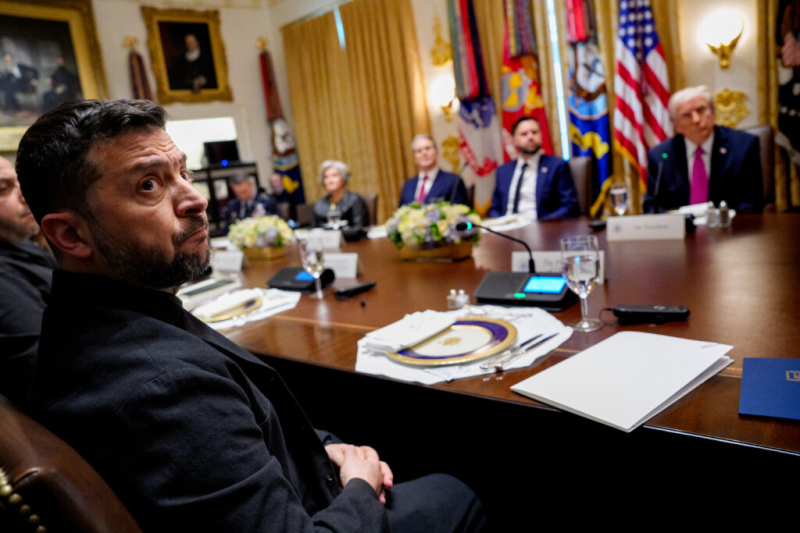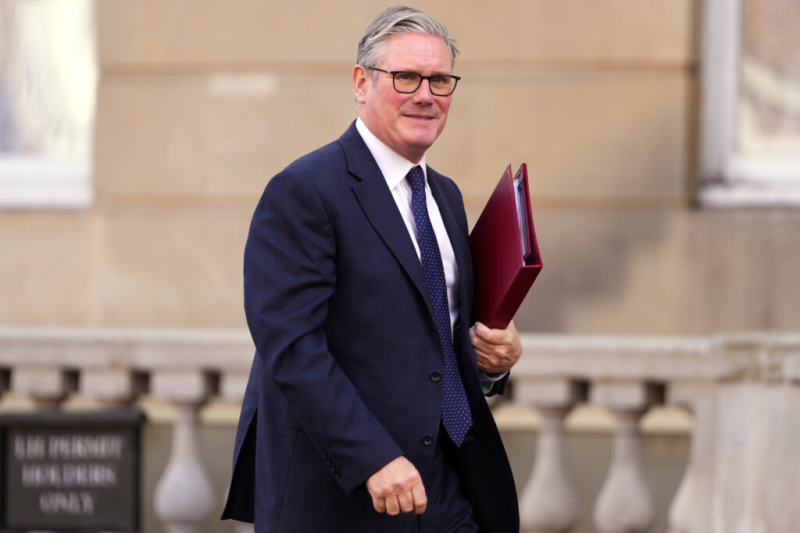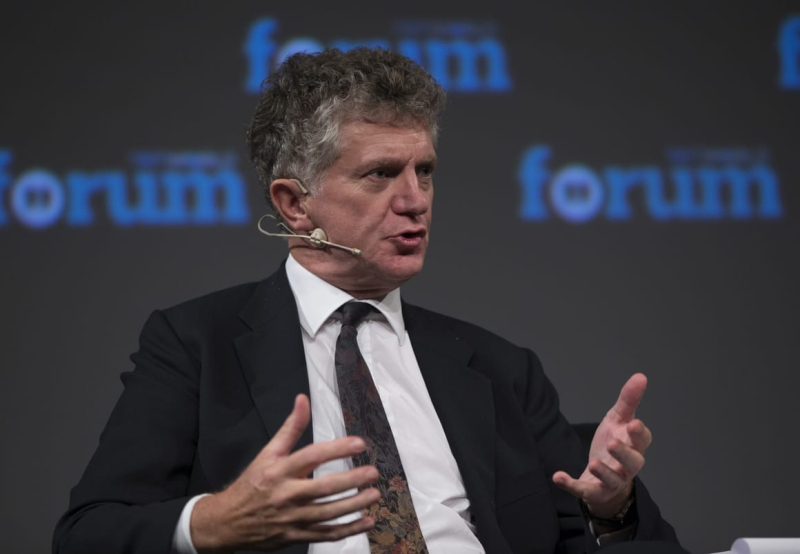Amid a row over a collapsed China spying trial, it’s not just Keir Starmer who relies on veteran Northern Ireland peace negotiator Jonathan Powell.
LONDON — Jonathan Powell gives Britain’s prime minister his street cred on the world stage. Keir Starmer — and European leaders too — might do well to keep him in their gang.
As the world tries to both keep the fragile Gaza ceasefire on track and resolve the long-running war in Ukraine, Starmer’s top foreign policy aide — also the country’s national security adviser — is taking flak.
Jonathan Powell, a veteran of Tony Blair’s government, is feeling the political heat over the collapse of a high-profile Chinese espionage trial.
Starmer’s Westminster opponents say Powell has questions to answer about a crucial government meeting held before prosecutors dropped charges against two alleged Chinese spies operating in Westminster. They have cited a lack of government evidence that Beijing posed a threat to national security.
No. 10 has repeatedly insisted the meeting was about handling Britain’s wider relationship with China, not the trial evidence. Colleagues fiercely defend Powell, a political appointee, who they insist was not involved in any decisions about evidence put before the court.
But China hawks and Starmer’s critics smell blood. The fact that his political opponents are so vehemently attacking the national security adviser speaks volumes about Powell’s importance in the No. 10 operation.
He would be a “good scalp,” one former Conservative adviser, still closely connected to the party and granted anonymity, like others in this piece, said. Powell is “someone we know the PM relies on.”
‘Unique credibility’
It’s not just Starmer who wants Powell in the room when big diplomatic decisions are being made. Britain’s allies seem to rate him too.
In Paris, one French MEP noted Powell is “the man to watch” in the Starmer administration.
He has “unique credibility” in international circles, a European diplomat said, citing Powell’s well-documented background in international conflict resolution, after playing a crucial role in securing peace in Northern Ireland as ex-PM Blair’s chief of staff.
“His deep personal networks equip him with credibility that resonates globally,” the European diplomat said. They pointed to the direct line Powell has to Washington, including links with Trump’s National Security Advisor Michael Waltz, and to Volodymyr Zelenskyy’s Chief of Staff, Andriy Yermak, in Kyiv.
Powell draws on his personal network. “There are various examples of when there have been attempts through official channels to make contact with a prime minister or president’s office, to no avail. But Jonathan will know somebody who knows somebody, which means the contact can be made right away,” a former No. 10 official said.

As the finishing touches to Trump’s Gaza peace plan were being drawn up earlier this month, Powell was in regular contact with both Blair and the White House, particularly United States Special Envoy to the Middle East Steve Witkoff, a senior U.K. official noted.
Powell’s experience negotiating the Good Friday Agreement, the Northern Ireland peace deal struck after years of bloodshed, is directly relevant, the same British official said, bolstering U.K. claims they could, and should, play a key role in implementing the Gaza plan.
The inclusion of phased incentives, an amnesty for former Hamas members, as well as a process for security normalization, all have echoes of elements of the Good Friday Agreement.
On the Ukraine beat, Powell has been credited — alongside Starmer, Finnish President Alexander Stubb and NATO Secretary-General Mark Rutte — as a key player in helping to repair the damage of Zelenskyy’s Oval Office brawl with Donald Trump in March, helping coach the Ukrainian president in how to best approach the U.S. president.
Inner sanctum
It was Powell who Starmer singled out for inclusion at an August White House summit of European leaders to discuss Ukraine when he was limited to just one adviser, a person with knowledge of the delegation said.
Powell joins the morning meeting of Starmer’s half a dozen most senior aides when there is foreign policy to discuss, a separate person with knowledge of those meetings said. He sits two rooms from the PM and reports directly to Starmer, not to Downing Street Chief of Staff Morgan McSweeney, like other senior advisers.
He works with a team including private secretary for foreign affairs Ailsa Terry and long-serving political aide Henna Shah, who also advises on foreign policy. But Powell provides “the strategic overlay for everything that’s done on the foreign policy side,” the former No. 10 official quoted above said.
“Powell is a proper grown-up. He’s a heavy-hitter — he’s bigger than almost anyone in there [No. 10],” a second former No.10 official said.
“All foreign policy is driven out of Jonathan Powell,” a current government official added. Some civil servants even refer to him as “the real foreign secretary.”
“He is one of the most knowledgable people in government — if you put a bunch of SpAds [advisers] together he probably has more knowledge on foreign policy than all of them combined,” a person who has worked with Powell in the past said.
“He is quietly confident. If he [has] something he wants to pursue he will do it,” they added.
Indeed, Powell was an influence on Starmer’s government before it existed. David Lammy, Starmer’s first foreign secretary, and his team took soundings from Powell before the 2024 general election that swept Labour back to power.
Tension
But Powell’s dual roles as national security adviser and the PM’s leading foreign policy aide mean he embodies a tension at the core of every government — how to balance security against diplomacy.

“He is operating on a different level because of who he is and what he brings. We haven’t had a national security adviser who has operated in the way that he has,” a second U.K. official said.
The first former No. 10 official noted he is “used to operating within the center of that Venn diagram. That is what he knows and understands, going back to when he was working on the Northern Ireland brief in No. 10 under Tony Blair.”
Powell’s profile — and broad reach — comes with political risk, too, as this month’s China furor has demonstrated.
Even before the collapse of the spy case, his stance on China was under scrutiny. He was appointed special envoy for negotiations between the U.K. and Mauritius on the Chagos Islands — linking him to the controversial government decision to go ahead and hand the territory back to an ally of China.
“He’s more publicly prominent [than other NSAs] because he’s a more public figure than most,” Alex Thomas, a program director at the Institute for Government, said.
“What you’re buying with Jonathan Powell is a more expansive character who will range across the foreign policy piece.
“There are only so many hours in a day, so playing a wider foreign policy role means that some of those domestic security questions are more likely to be to be delegated under departments or to others in the national security operations in the Cabinet Office,” Thomas said.
There is frustration in No. 10 that much of the heat around the China case has been fuelled by government secrecy that aides believe is necessary due to national security laws.
Likewise, despite his high profile, Powell has, until now, been protected from any parliamentary scrutiny.
Ministers have only just agreed he can be quizzed by the Joint National Security Strategy Committee on the government’s national security strategy — albeit in private — after a year-long stand-off with the group of lawmakers.
“There’s a scrutiny gap there, and of course, all officials prefer to operate with without the hassle of parliamentary or other scrutiny, but that doesn’t always lead to the best outcomes,” Thomas points out.
Powell’s role at the center of the Starmer administration will mean more — not less — scrutiny in the months and years ahead.
Jamie Dettmer and Clea Caulcutt contributed reporting from Brussels and Paris respectively.

